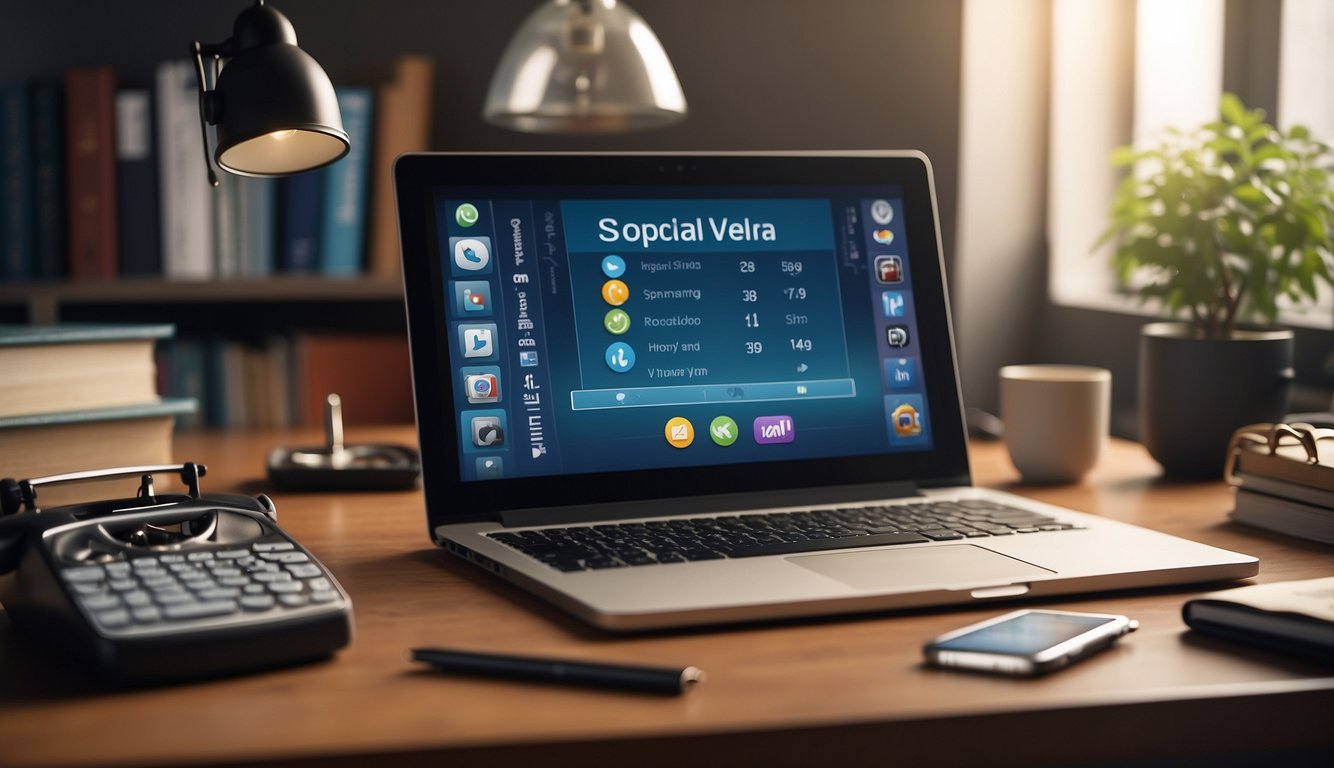Are you tired of constantly checking your social media while studying? Do you find yourself scrolling through Instagram or Facebook instead of focusing on your work?
Social media can be a significant distraction, especially when you’re trying to study or complete assignments. However, there are several strategies you can use to avoid getting sidetracked by social media while studying.
First, it’s essential to recognize the impact that social media can have on your productivity. According to a study by the American Psychological Association, constantly checking social media can lead to increased stress, anxiety, and decreased academic performance.
By minimizing your social media use while studying, you can improve your focus and ultimately achieve better results. So, how can you avoid the temptation of social media?
Table of contents
Understanding the Impact of Social Media Distractions

When it comes to studying, social media can be a significant distraction. It’s easy to get caught up in scrolling through your feed or checking notifications instead of focusing on your work. However, the impact of social media distractions goes beyond just wasting time.
Research has shown that social media use can have adverse effects on cognitive function, including attention span, memory, and decision-making abilities. Additionally, excessive social media use has been linked to increased stress and anxiety levels, which can further hinder academic performance.
One way social media can be particularly distracting is through the use of notifications. Constantly receiving notifications can interrupt your concentration and make it challenging to stay on task. To combat this, consider turning off notifications or setting specific times to check your social media accounts.
Another factor to consider is the addictive nature of social media. The constant stream of new content and the fear of missing out (FOMO) can make it challenging to step away from your phone or computer. It’s important to recognize when social media use becomes excessive and to set boundaries for yourself.
Overall, understanding the impact of social media distractions is an essential step in avoiding them while studying. By recognizing the adverse effects and taking steps to limit your use, you can improve your focus and academic performance.
Establishing a Productive Study Environment

When it comes to studying, a productive study environment can make all the difference. Here are some tips for creating a space that will help you stay focused and avoid distractions.
Choosing the Right Study Space
Choosing a suitable study space is crucial to your success. You want to find a space that is quiet, comfortable, and free from distractions. Here are some things to consider when choosing a study space:
- Location: Choose a location that is quiet and free from distractions. This could be a library, a quiet room in your house, or a coffee shop.
- Comfort: Make sure your study space is comfortable. You don’t want to be sitting in an uncomfortable chair for hours on end.
- Lighting: Good lighting is essential for studying. Make sure your study space is well-lit so you can see your work clearly.
- Technology: Make sure your study space has all the technology you need to study effectively. This could include a computer, a printer, and a reliable internet connection.
Eliminating Physical Distractions
Physical distractions can be just as distracting as digital distractions. Here are some things you can do to eliminate physical distractions:
- Clear your space: Make sure your study space is clean and organized. A cluttered space can be distracting.
- Remove distractions: Remove anything from your study space that could be distracting. This could include your phone, video games, or anything else that could take your attention away from your work.
- Use noise-canceling headphones: If you’re studying in a noisy environment, consider using noise-canceling headphones to block out distractions.
By creating a productive study environment, you’ll be able to stay focused and avoid distractions, allowing you to study more effectively.
Creating a Study Schedule

When it comes to studying, having a schedule can help you stay organized and focused. Here are some tips for creating a study schedule that will help you avoid distractions from social media.
Setting Clear Goals
Before you start creating your study schedule, it’s essential to set clear goals for what you want to achieve. This will help you stay motivated and focused on your studies. Make sure your goals are specific, measurable, and achievable. For example, instead of setting a goal to “study for three hours,” set a goal to “complete two chapters of the textbook.”
Allocating Time for Breaks
It’s essential to take breaks while studying to avoid burnout and maintain focus. When creating your study schedule, make sure to allocate time for breaks. A good rule of thumb is to take a 5-10 minute break every hour. During your break, try to do something that will help you relax and recharge, such as taking a walk or listening to music.
Here’s an example of what your study schedule could look like:
| Time | Activity |
|---|---|
| 10:00 am – 10:10am | Study Chapter 1 |
| 10:00 am – 10:10 am | Break |
| 10:10 am – 11:10 am | Study Chapter 2 |
| 11:10 am – 11:20 am | Break |
| 11:20 am – 12:20 pm | Study Chapter 3 |
| 12:20 pm – 12:30 pm | Break |
| 12:30 pm – 1:30 pm | Study Chapter 4 |
By setting clear goals and allocating time for breaks, you can create a study schedule that will help you stay focused and avoid distractions from social media.
Leveraging Technology to Stay Focused

Studying can be challenging, especially when social media is just a click away. Fortunately, technology can also be used to help you stay on track.
Here are some ways to leverage technology to stay focused on your studies.
Using Apps to Block Social Media
There are many apps available that can help you block distracting websites and apps, including social media. Some popular options include Freedom, Cold Turkey, and SelfControl. These apps allow you to block specific websites or apps for a set period, helping you to stay focused on your studies.
Turning Off Notifications
Notifications can be a significant distraction when studying. To avoid getting sidetracked by social media notifications, consider turning them off. You can do this on your phone or computer by going into the settings and disabling notifications for specific apps or turning off notifications altogether.
By leveraging technology to stay focused, you can make studying a more productive and efficient experience. Try using apps to block social media and turning off notifications to avoid distractions and stay on track.
Developing Self-Discipline

To avoid getting distracted by social media while studying, you need to develop self-discipline. Self-discipline is the ability to control your actions and resist temptations. Here are two ways to develop self-discipline:
Practicing Mindfulness
Mindfulness is the practice of being present and fully engaged in the current moment. It can help you stay focused on your studies and avoid distractions. Here are some ways to practice mindfulness:
- Take deep breaths and focus on your breath.
- Pay attention to your surroundings and the sensations in your body.
- Avoid multitasking and focus on one task at a time.
- Take breaks and give yourself time to recharge.
Building Willpower
Willpower is the ability to resist short-term temptations in order to achieve long-term goals. Here are some ways to build willpower:
- Set clear goals and make a plan to achieve them.
- Use positive self-talk to motivate yourself.
- Avoid situations that tempt you to use social media.
- Reward yourself for staying focused and avoiding distractions.
By practicing mindfulness and building willpower, you can develop self-discipline and avoid getting distracted by social media while studying.
Engaging in Healthy Study Habits

To avoid getting distracted by social media while studying, it is essential to establish healthy study habits. Here are some tips to help you stay focused:
Active Learning Techniques
One effective way to stay engaged while studying is to use active learning techniques. This involves actively participating in the learning process rather than passively reading or listening. Examples of active learning techniques include:
- Taking notes: Writing down key points and ideas can help you better retain the information you are studying.
- Summarizing: Summarizing the material in your own words can help you better understand and remember it.
- Asking questions: Asking yourself questions about the material can help you stay engaged and focused.
Regular Review Sessions
Regular review sessions can also help you stay on track while studying. Rather than cramming for an exam at the last minute, try to review the material on a regular basis. This can help you better retain the information and reduce the likelihood of getting distracted by social media. Here are some tips for incorporating regular review sessions into your study routine:
- Create a schedule: Set aside specific times each week for review sessions.
- Break it up: Instead of trying to review everything at once, break the material up into smaller chunks and review a little bit each day.
- Use flashcards: Flashcards can be a valuable tool for reviewing key terms and concepts.
By incorporating active learning techniques and regular review sessions into your study routine, you can help minimize distractions and stay focused on your studies.
Seeking External Support

When it comes to avoiding social media distractions while studying, seeking external support can be a great way to stay on track. Here are two options to consider:
Study Groups
Joining a study group can help you stay accountable and focused. By studying with others who have similar goals, you can motivate each other to stay on task and avoid distractions. Additionally, study groups can be a great way to bounce ideas off of one another and get feedback on your work.
To find a study group, consider reaching out to classmates, joining a student organization related to your field of study, or checking with your school’s academic support center.
Accountability Partners
An accountability partner is someone with whom you check in regularly to discuss your progress and goals. This person can help keep you on track and hold you accountable for avoiding social media distractions while studying.
To find an accountability partner, consider reaching out to a friend or family member who is also working towards a goal, or check with your school’s academic support center to see if they offer any accountability programs.
Remember, seeking external support is just one strategy for avoiding social media distractions while studying. It’s essential to find what works best for you and stick with it.
